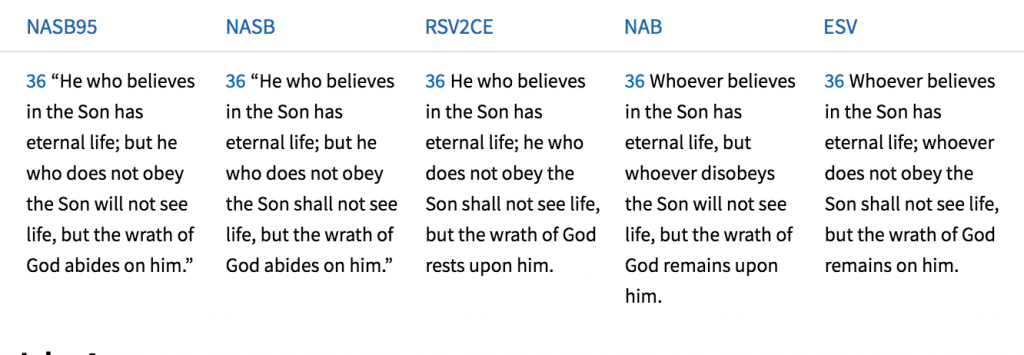
Here is the email I received:
Steve,
Yesterday, I watched the speech that you gave at the Franciscan University of Steubenville on “Faith Alone”, and I think your reference to the definition/opposite of belief in John 3:36 is a nail in the coffin to “Sola Fide”. My question is this: what if someone’s Bible doesn’t list the opposite of belief as “do not obey”, but rather “reject” or “not believe” (such as the KJV, NIV, Darby, etc.)? How do you argue for the version of the Bible that spells out “do not obey”, such as the RSVCE, that it’s the correct translation of Sacred Scripture?
Thanks Bill (made up name for anonymity)
Here is the text of John 3:36:
John 3:36 (RSVCE) “He who believes in the Son has eternal life; he who does not obey the Son shall not see life, but the wrath of God rests upon him.”
Here is my response:
Bill:
*****************************************
apeithe?. This word means “to be disobedient” and is a significant term in the LXX (Greek Old Testament) for disobedience to God. In the NT it is used of the wilderness generation in Heb. 3:18, that of the flood in 1 Pet. 3:20, all sinners in Rom. 2:8, and Gentiles in Heb. 11:31. Rom. 11:30. “To believe” is the opposite in Acts 14:1–2, and unbelief is parallel. We find an absolute use in Acts 14:2. Rom. 15:31; 1 Pet. 2:7. Important phrases are disobeying the word (1 Pet. 2:8), the gospel (4:17), and the Son (Jn. 3:36).
(Gerhard Kittel, Gerhard Friedrich, and Geoffrey William Bromiley, Theological Dictionary of the New Testament (Grand Rapids, MI: W.B. Eerdmans, 1985), 819–820.)
*******************************************
Disobeys occurs only here in John’s Gospel; it is obviously the opposite of believes, and so JB and Phps translate “refuses to believe.” It is possible to argue that the meaning of disobeys throws some light on the meaning of believes, that is, this kind of belief is the belief which leads to obedience. Therefore one may translate “Whoever obeys the Son has eternal life, and whoever disobeys the Son will never have life.” However, it is better to retain the terms “believes” and “disobeys,” since the very lack of clear opposition tends to reinforce the meaning of the respective terms.
(Barclay Moon Newman and Eugene Albert Nida, A Handbook on the Gospel of John, UBS Handbook Series (New York: United Bible Societies, 1993), 105.)

-
Save


